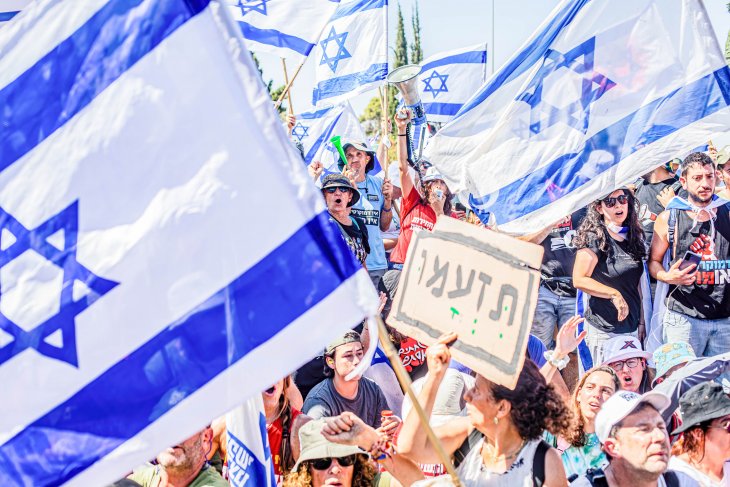For the past few months Israel has experienced mass demonstrations both for and against the attempted judicial “reforms” by the current right-wing government.

A striking visual theme of the protests have been the ubiquity of the Israeli flag. Photo from Jerusalem in July: Eyal Warshavsky/SOPA Images/LightRocket via Getty Images
A striking visual theme of these protests have been the ubiquity of the Israeli flag. The use of national symbols like the Israeli flag is nothing unusual for Israel’s right-wing movements, indeed it has long been associated with the nationalist right-wing manifestations like the flag march through Jerusalem’s Palestinian parts.
The use of the Israeli flag among the central-leftist protesters is however exceptional. By transforming the flag into a symbol of the mass demonstrations to salvage Israeli democracy, the Israeli center-left has been engaged in a struggle to take back the Israeli flag from the right.
This tactic has a twofold purpose: it undermines the dominance of one of the right’s most potent political symbols, while also thwarting opponents from branding the protest movement as disloyal to the state.
Concerns about the occupation
While many commentators have deemed these popular demonstrations a potential safeguard for democracy, their unfolding also raises concerns about the more than 55 years ongoing Israeli occupation of Palestinian territory. The powerful reappropriation of the blue-and-white flag obscures the role of Palestinians in relation to Israeli democracy.
The use of the flag has furthermore alienated the Palestinian community within Israel, raising questions about Palestinian inclusion and the nature of the democratic ideals being advocated by the protesters. Although the mass demonstrations disregard the Palestinians, they have nevertheless elicited sympathy from substantial segments of Israel’s Palestinian minority.
Meanwhile, politicians of Israel’s current extreme right-wing government have issued bills to ban the public display of Palestinian flags. In fact, Itamar Ben-Gvir, Israel’s national security minister, early this year instructed the police to enforce the prohibition of flying Palestinian flags in the public sphere to stop any incitement against the State of Israel.
Democracy vs equality
The prevalence of the Israeli flag, combined with the notable absence of anti-occupation rhetoric and the Palestinian flag, paints a picture where Israel’s primary challenge appears to be centered around democratic concerns for its Jewish population and not one of occupation which carries questions of democratic rights at its core.
A member of the political opposition party Hadash, Raja Zaatry, explains: “The protesters today are calling for a return to the status quo ante, to what came just before the Netanyahu government.” Jewish protesters “call for democracy, but the Arabs say that democracy is not possible without equality, and democracy cannot coexist with occupation and [military] control over millions of people.”
And yet, the pro-democracy movement has not issued distinct statements opposing Israel’s indefinite military control over millions of Palestinians, nor did they condemn the recent military operation in Jenin in the northern West Bank, which the United Nations has accused of violating international law. Indeed, their leaders even praised the “brave men” who took part in the military invasion.
The conflict with Palestinians and Israel’s internal challenges are seen as separate
This paradox underscores a prevalent perspective among Jewish Israelis, wherein the conflict with Palestinians and Israel’s internal challenges are seen as separate. A small part of the protest movement, including Israeli Palestinians, argue that this is a grave oversight, and that the current choice of democratic principles highlights Israelis’ disconnect from the struggles faced by those under occupation.
“It’s incredibly ironic that they’re advocating and demonstrating for democracy, yet simultaneously, Palestinians have been living under a dictatorship for 75 years,” remarked Diana Buttu, a Palestinian analyst. “They seem apprehensive that their own advantages and entitlements might be impacted, but they fail to establish the correlation” with the ongoing occupation.
Anti-occupation protesters
The few protesters who have tried to raise the issue of the occupation have experienced resistance from the organizers, who are afraid that addressing the occupation might undermine the momentum of the protest movement.
Furthermore, some protesters have expressed dissatisfaction with the anti-occupation faction and their use of Palestinian flags and anti-occupation slogans. In early July, members of the army reservist group “Brothers and Sisters in Arms” attacked anti-occupation members for displaying the Palestinian flag during protests.
And while many participants may express support for the anti-occupation movement outside of the protests, the strong attachment to the Israeli flag underscores a failure to recognize the discrepancy with their symbol and the absence of the Palestinian issue in their proclaimed fight for democracy.
These developments suggest that while the Israeli public is engaged in an important battle to fight democratic decline, the focus seems to be on Israel’s Jewish population, again overshadowing the democratic rights of Palestinians under occupation as well as Israel’s Palestinian minority.
We therefore urge the international community to be persistent it its support for Israel’s pro-democratic forces, but at the same time ensure that the issue of Palestinian democratic rights is not made invisible.
- Anne Lene Stein, Ph.D candidate at Lund University, Department of Political Science
- Lisa Strömbom, Associate Professor at Lund University, Department of Political Science
- This text has been published in a Swedish-language version by Sydsvenskan 21 August 2023.